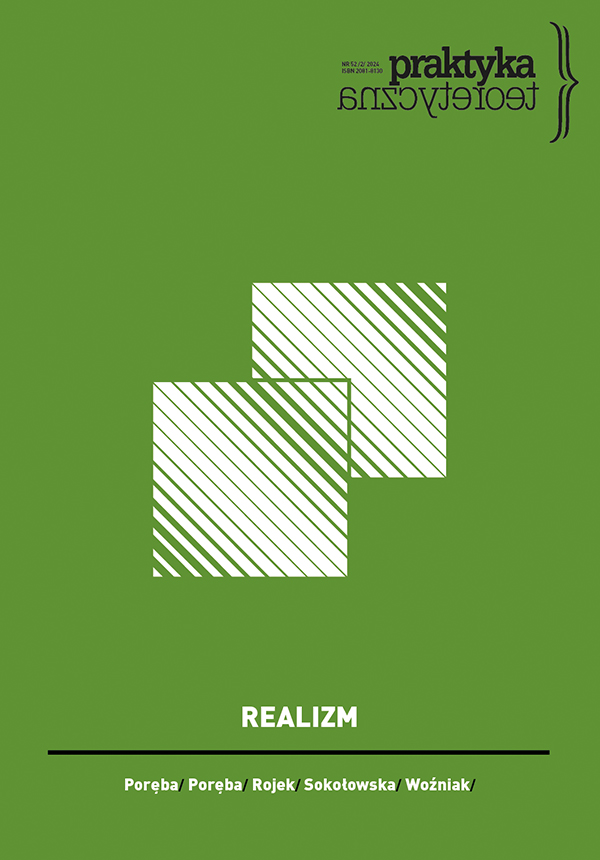

Articles

The article aims to reflect on the concept of realism in art, based on the theoretical texts of Bertold Brecht, who repeatedly pointed out that a realistic work, that is, striving to provide the most accurate image of the world, is not the result of a single method, the formal introduction of which will ensure realism. The question of a particular technique should therefore be accompanied by the question of the reason for its use. Using, in addition, other Marxist texts on realism (Roger Garaudy, Todd Cronan), I try to show that Brecht’s broad and formally undetermi- ned notion of realism makes it possible to ask about realism also in the works of writers using avant-garde strategies and techniques that seemingly produce a reality that is completely unreal. I also assume that pointing out how authors – in this case Andrzej Szpindler – use distortions of reality to express some essential truth about it and understand its deeper, less overt structures, can contribute to broadening the contemporary understanding of realism. The essential part of the article, therefore, is an interpretation of two of Szpindler’s novels Oko chce tego bardziej niż chce tego wątroba, and Źrebię puchacza i tabloidu. The stakes of the text are, firstly, to demonstrate that the author is interested in creating accurate representations of reality and to show, using the example of his work, how many formal means can be useful for this; and secondly, to prove the productivity of Brecht’s take on realism for analyzing and evaluating the works of contemporary artists as well.
Adorno, Theodor W., i Jameson, Fredric. 1980. Aesthetics and Politics. Tłum. Anya Bostock et al. London: Verso.
Aragon, Louis. 1967. „Przedmowa”. W Garaudy, Roger, Realizm bez granic. Warszawa: Czytelnik.
Barcz, Anna. 2016. Realizm ekologiczny. Od ekokrytyki do zookrytyki w literaturze polskiej. Katowice: „Śląsk” Wydawnictwo Naukowe.
Bhaskar, Roy. 2001 „Idealism”. W Bottomore, Tom, A Dictionary of Marxist Thought. Oxford–Malden: Blackwell Publishers.
Brecht, Bertolt. 1967. Schriften zur Literatur und Kunst. T. 2. Frankfurt am Main: Suhrkamp Verlag.
Brecht, Bertolt. 2003. Brecht on Art and Politics, red. Tom Kuhn i Steve Giles. Tłum. Laura Bradley, Steve Giles i Tom Kuhn. London: Bloomsbury Methuen Drama.
Brecht, Bertolt. 2013. „Brecht Dossier: Six Essays on Painting and Theatre”. Tłum. Mordecai Gorelik. Non-site 10. https://nonsite.org/ brecht-dossier/
Brecht, Bertolt. 2019. Brecht On Theatre, red. Marc Silberman, Steve Giles i Tom Kuhn. London: Bloomsbury Academic.
Brown, Nicholas. 2023. O sztuce i formie towarowej, red. Paweł Kaczmarski. Tłum. Łukasz Żurek. Praktyka Teoretyczna 4(50). https://wuwr.pl/prt/article/view/15697
Brown Nicholas. 2019. Autonomy. The Social Ontology of Art under Capitalism, Durham-London: Duke University Press.
Cronan, Todd. 2022. Red Aesthetics. Rodchenko, Brecht, Eisenstein. London: Rowman & Littlefield.
Cronan, Todd. 2023. „Marxism versus The Avant-Garde”. Non-site 41. https://nonsite.org/red-aesthetics-rodchenko-brecht-eisenstein/
Dauksza, Agnieszka. 2017. „Laboratorium artystyczne: realizm afektywny. Praktyki Joanny Rajkowskiej”. Teksty Drugie 1: 373–381.
Fisher, Mark. 2023. Dziwaczne i osobliwe. Tłum. Andrzej Karalus i Tymon Adamczewski. Gdańsk: słowo/obraz terytoria.
Garaudy, Roger. 1967. Realizm bez granic. Tłum. Ryszard Matuszewski. Warszawa: Czytelnik.
Głowiński, Michał. 2002. „Realizm”. W Głowiński, Michał et. al., Słownik terminów literackich. Wrocław: Zakład Narodowy im. Ossolińskich.
Jameson, Fredric. 1998. Brecht and Method. London–New York: Verso.
Jarecka, Dorota. 2021. Surrealizm, realizm, marksizm. Sztuka i lewica komunistyczna w Polsce w latach 1944–1948. Warszawa: Instytut Badań Literackich PAN.
Kapela, Jan. 2010. „Kumpelska awangarda. Literatura jako narzędzie emancypacji”. Polisemia 4. https://www.polisemia.com.pl/numery-czasopisma/numer-42010-4-strategie-awangardowe-w-poezji/kumpelska-awangarda-literatura-jako-narz%C4%99dzie-emancypacji
Kopkiewicz, Aldona. 2010. „Po drugiej stronie lustra”. Dwutygodnik 39. https://www.dwutygodnik.com/artykul/1457-po-drugiej-stronie-lustra.html
Kozioł, Paweł. 2011. Przerwane procesy. Warszawa: Lampa i Iskra Boża.
Kujawa, Dawid. 2018. „Możliwe Światy przeciwko reżimowi dywidualności. Skąd się wzięła Nowa Faza i dlaczego może okazać się potrzebna nam wszystkim?”. Wakat. http://wakat.sdk.pl/mozliwe-swiaty-przeciwko-rezimowi-dywidualnosci-skad-wziela-sie-nowa-faza-dlaczego-moze-okazac-sie-potrzebna-nam-wszystkim/
Lam, Andrzej, i Owczarek, Bogdan, red. 1979. Marksizm i literaturoznawstwo współczesne. Antologia. Warszawa: Państwowy Instytut Wydawniczy.
Magnone, Lena. 2008. „Traumatyczny realizm”. W Lacan, Žižek. Rewo- lucja pod spodem, red. Przemysław Czapliński. Poznań: Poznańskie Studia Polonistyczne.
Markiewicz, Henryk. 1996. Główne problemy wiedzy o literaturze. Prace wybrane. T. 3. Kraków: Universitas.
Matwiejczuk, Filip. 2023. „Pędzącej Szpinlderyzy nikt już nie powstrzyma! – powrót bobaspecjalisty”. Stoner Polski. https://stonerpolski.pl/pedzacej-szpindleryzy-nikt-juz-nie-powstrzyma-powrot-bobaspecjalisty/
Szpindler, Andrzej. 2010. Oko chce bardziej, niż chce tego wątroba! Kraków: Wydawnictwo Ha!art.
Szpindler, Andrzej. 2022. Źrebię puchacza i tabloidu. Warszawa: Convivo.
Wawrzyńczyk, Rafał. 2018. „Ten tekst miał nazywać się «dzicy»”. Dwutygodnik 253. https://www.dwutygodnik.com/artykul/8170-ten--tekst-mial-nazywac-sie-dzicy.html

This work is licensed under a Creative Commons Attribution-ShareAlike 4.0 International License.